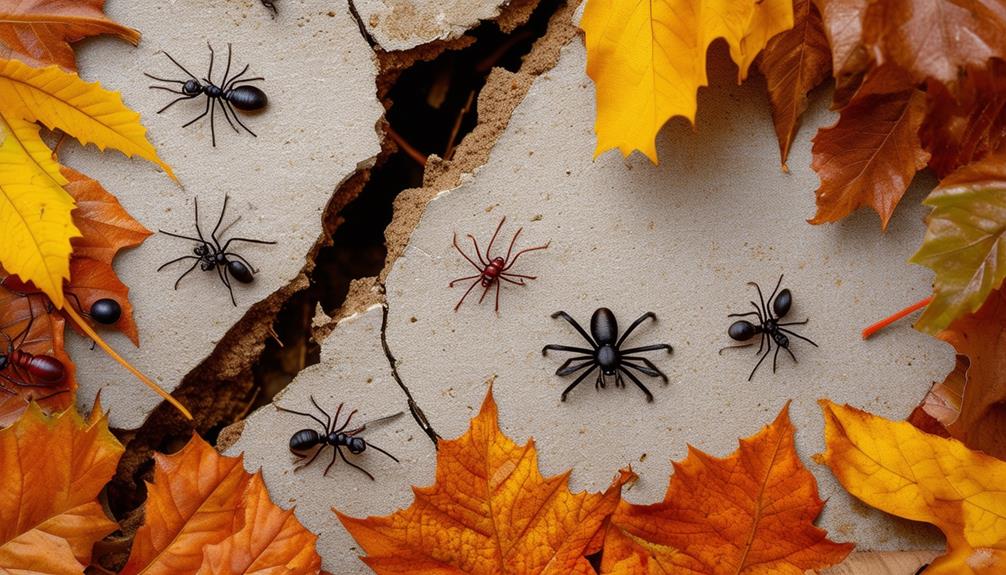Are you tired of dealing with pesky bugs invading your space? Look no further than your pantry for a solution – vinegar! Yes, that’s right, vinegar can be an effective bug repellent. With its chemical composition and natural properties, vinegar has shown promise in keeping insects at bay.
In this article, you will discover the effectiveness of vinegar against specific insects and learn how to use it as a bug repellent. We will also discuss the limitations and considerations when using vinegar, as well as alternative natural bug repellents for those seeking different options.
Safety and environmental concerns will be addressed, ensuring that you can repel bugs while still being mindful of your surroundings. By the end of this article, you will have a clear understanding of whether vinegar is the right choice for keeping bugs away and be armed with recommendations to serve your bug-free needs.
Key Takeaways
- Vinegar is a natural disinfectant and can repel insects like ants and fruit flies due to its strong smell.
- Vinegar can be effective in deterring mosquitoes by masking the carbon dioxide we exhale.
- It is important to use vinegar in combination with other prevention methods for best results.
- Vinegar may not be as effective as commercial bug repellents and its efficacy may vary depending on the type of insect.
The Chemical Composition of Vinegar
Vinegar is made up of acetic acid, water, and small amounts of other chemicals. Acetic acid, the main component of vinegar, is known for its antimicrobial properties. It can kill certain bacteria and fungi, making it a natural disinfectant. This is why vinegar is often used for cleaning purposes.
The acidity of vinegar makes it a useful ingredient in cooking and food preservation. It can help break down proteins and tenderize meat. Vinegar also has the ability to deter certain pests, such as ants and fruit flies, due to its strong odor. While vinegar may not completely eliminate bugs, it can help keep them away.
So, next time you’re looking for a natural cleaning solution or a way to keep bugs at bay, consider using vinegar.
Effectiveness Against Specific Insects
When it comes to effectiveness against mosquitoes, vinegar can be quite useful. Mosquitoes are attracted to the carbon dioxide we exhale, and vinegar’s strong scent can help mask that odor, making it harder for mosquitoes to find their human targets. However, it’s important to note that vinegar alone may not be sufficient to repel mosquitoes completely. It could be used as a supplementary repellent, alongside other proven methods such as wearing long sleeves and using mosquito nets.
As for ants, vinegar can be effective in deterring them, especially when used as a spray on their trails and entry points. The strong smell disrupts their chemical trails, making it harder for them to navigate and communicate.
Overall, while vinegar can be helpful in repelling certain insects like mosquitoes and ants, it should be used in combination with other prevention methods for best results.
How to Use Vinegar as a Bug Repellent
Using vinegar as a bug repellent is a simple and effective way to keep those pesky critters at bay. It has both pros and cons as a natural insect deterrent.
One of the pros is that vinegar is readily available and inexpensive. It is also non-toxic and safe for humans and pets.
However, the effectiveness of vinegar as a bug repellent may vary depending on the type of insect you want to repel. Some insects, like ants and fruit flies, are highly sensitive to the smell of vinegar and will stay away from areas where it is applied.
To use vinegar as a bug repellent, you can mix equal parts vinegar and water in a spray bottle and spray it around windows, doorways, and other areas where insects may enter your home. Another way is to soak a cloth or cotton balls in vinegar and place them in problem areas.
Overall, vinegar can be a useful tool in your battle against bugs, but it may not work for all types of insects.
Limitations and Considerations
However, it’s important to be aware of the limitations and factors to consider when using vinegar as a bug repellent. While vinegar can be effective in repelling bugs, there are both pros and cons to using it.
One of the main advantages of vinegar is that it is a natural and affordable option. It is also readily available in most households, making it convenient to use.
However, vinegar may not be as effective as commercial bug repellents, especially against certain types of insects. Additionally, there can be potential side effects when using vinegar as a bug repellent. Some people may find the strong smell unpleasant, and it can also cause irritation or allergic reactions on sensitive skin.
It’s important to test vinegar on a small area of skin before applying it all over.
Alternative Natural Bug Repellents
One option to consider for keeping pesky insects at bay is by trying out alternative natural bug repellents.
Essential oil blends can be an effective and pleasant-smelling alternative to vinegar. Certain essential oils, such as citronella, lavender, and eucalyptus, have been shown to repel insects like mosquitoes and flies.
You can make your own homemade bug spray using these essential oils. Simply mix a few drops of your chosen essential oils with a carrier oil, such as almond or coconut oil, and apply it to your skin or clothing.
This DIY bug spray can be a great alternative to chemical-based repellents, especially for those who prefer natural options. Remember to always follow the instructions and test a small area of your skin before applying the homemade bug spray more widely.
Safety and Environmental Concerns
When it comes to natural bug repellents, it’s important to consider the safety and environmental concerns associated with their use.
While vinegar is often touted as an effective insect deterrent, it is crucial to understand the potential health risks and impact on the ecosystem.
Vinegar is generally safe for humans, but it can cause skin irritation or allergic reactions in some individuals.
Additionally, when vinegar is sprayed outdoors, it can have unintended consequences on plants and beneficial insects.
The acidity of vinegar can disrupt the pH balance of soil, potentially harming plants.
Moreover, vinegar’s strong smell may repel not only pests but also beneficial insects like bees and butterflies, which play a vital role in pollination.
Therefore, it is essential to weigh the potential health risks and environmental impact before relying solely on vinegar as a bug repellent.
Conclusion and Recommendations
To ensure your safety and minimize the negative impact on the environment, it’s important to carefully consider the potential risks and consequences before relying solely on natural bug repellents. While vinegar is often touted as a natural bug deterrent, its effectiveness may vary depending on the type of bug and the specific application technique used. In conclusion, vinegar can be a useful tool in repelling bugs, but it may not be as effective as chemical bug repellents. Additionally, it’s important to note that vinegar may not be suitable for all bug species and may have limited efficacy in high infestation areas. To maximize its effectiveness, it is recommended to apply vinegar directly to the areas where bugs are commonly found and to reapply as needed.
Frequently Asked Questions
Can vinegar be used as a bug repellent indoors and outdoors?
Vinegar can be used as a bug repellent both indoors and outdoors. It is effective in keeping bugs away in both settings. Compared to chemical bug repellents, vinegar is a natural and safer alternative.
Are there any specific insects that vinegar is not effective against?
Vinegar is effective as a bug repellent against many insects, including ants, flies, and mosquitoes. However, there are some specific insects, such as spiders and cockroaches, that are not affected by vinegar’s repelling properties.
What are some alternative natural bug repellents that can be used instead of vinegar?
Some alternative natural bug repellents include essential oils like citronella, eucalyptus, and peppermint. These repellents can provide protection against bugs and have the added benefits of being non-toxic and eco-friendly.
Can vinegar be harmful to pets or children if used as a bug repellent?
Using vinegar as a bug repellent around pets and children can be potentially harmful. It can cause skin irritation, eye irritation, and respiratory problems. It is important to consider safer alternatives for bug control.
Does vinegar leave any residue or smell after being used as a bug repellent?
After using vinegar as a bug repellent, you may have residue concerns. Vinegar can leave behind a strong smell that some find unpleasant. Consider proper ventilation to minimize the lingering scent.





